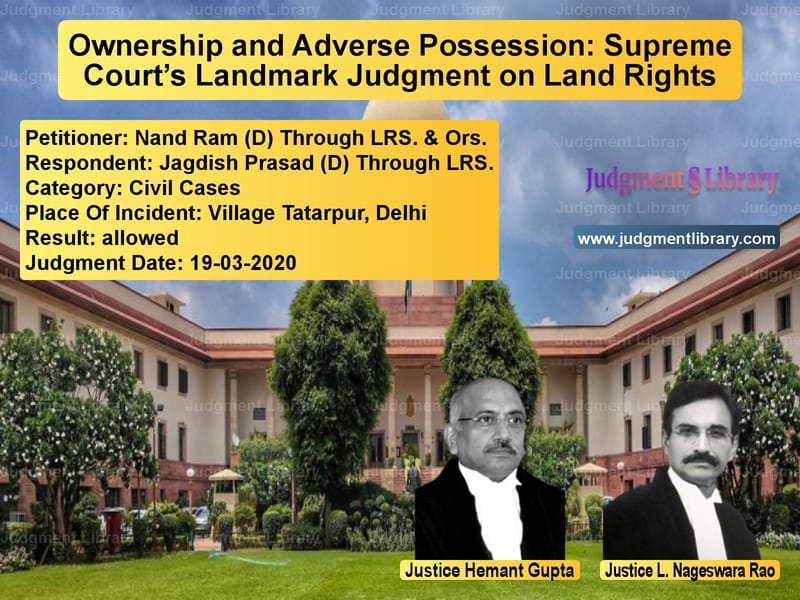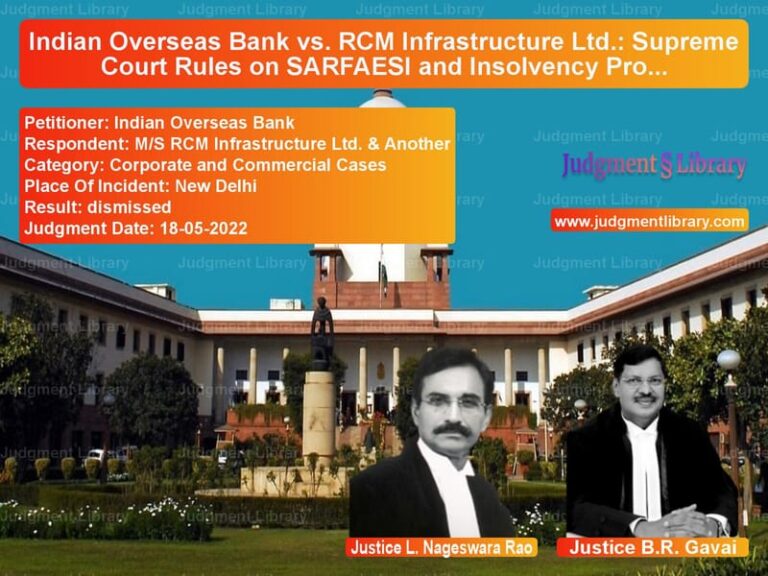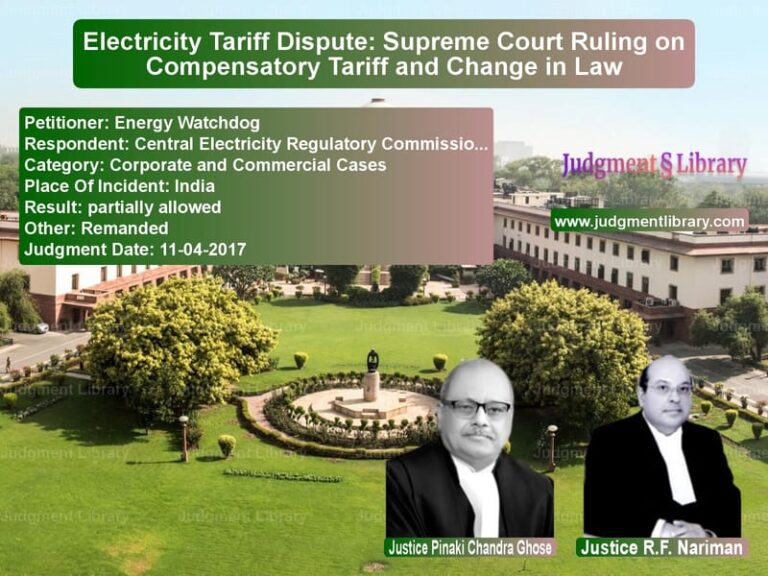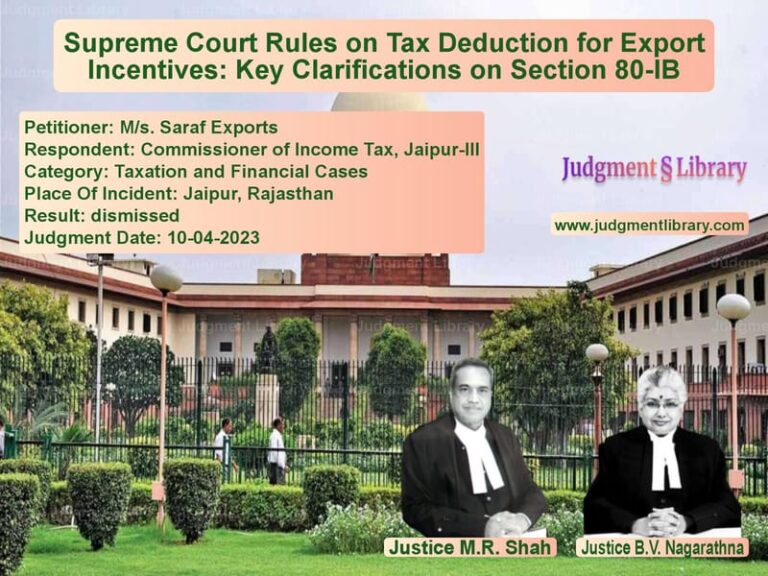Ownership and Adverse Possession: Supreme Court’s Landmark Judgment on Land Rights
The case before the Supreme Court revolved around a long-standing dispute over possession and ownership of land in Village Tatarpur, Delhi. The appellants, legal heirs of Bhagwana, sought possession of land measuring 3 Bighas 11 Biswas in Khasra No. 9/19. The respondent, Jagdish Prasad, had taken a portion of this land on a 20-year lease starting from September 23, 1954, but continued possession even after the lease expired.
The primary question before the Court was whether the respondent’s possession amounted to adverse possession or whether the appellants retained ownership rights. The Court also examined whether the suit was barred by limitation, considering the provisions of the Transfer of Property Act and the Limitation Act.
Background of the Case
The appellants filed a suit asserting their ownership rights, stating that the respondent’s lease had expired and his continued possession was unlawful. The respondent, on the other hand, argued that he had become the owner of the land through adverse possession.
The trial court ruled in favor of the appellants, affirming their ownership and ordering possession. This was upheld by the first appellate court. However, the Delhi High Court overturned these decisions, ruling in favor of the respondent, stating that the suit was barred by limitation.
Petitioner’s Arguments
The appellants contended:
- The respondent was initially a lessee and continued in possession even after the expiry of the lease, making him a tenant at sufferance, not an owner.
- The lease had expired on September 23, 1974, and their right to claim possession was governed by Article 67 of the Limitation Act, which allows a landlord to recover possession within 12 years.
- The Reference Court’s award denying the respondent’s claim to compensation for leasehold rights could not operate as res judicata in this suit for possession.
- The respondent had not proven continuous, open, and hostile possession for 12 years, as required for adverse possession.
Respondent’s Arguments
The respondent argued:
- He had been in possession for over 12 years without interruption, making his claim of adverse possession valid.
- The lease had ended much earlier, and since the appellants did not act promptly, their claim was barred by limitation under Article 66 of the Limitation Act.
- The Reference Court’s decision, which acknowledged the termination of the lease due to non-payment of rent, should operate as res judicata.
Supreme Court’s Observations
The Supreme Court analyzed whether the respondent’s possession was adverse or merely that of a tenant at sufferance. The Court made key observations:
- “The possession of an erstwhile tenant is juridical and he is protected from dispossession otherwise than in due course of law.”
- “A tenant who has been let into possession cannot deny his landlord’s title so long as he has not restored possession by surrender to his landlord.”
- “The finding returned in the award of the Reference Court that the lease stood determined on account of non-payment of rent was a finding made for a limited purpose, i.e., to deny the defendant compensation. It cannot be binding on the parties in a suit for possession based on title.”
- “Adverse possession requires the respondent to prove open, continuous, and hostile possession to the knowledge of the true owner. Mere possession as a tenant does not meet this requirement.”
Final Judgment
The Supreme Court ruled in favor of the appellants, holding that their suit was within the limitation period under Article 67 of the Limitation Act. The Court found that the respondent’s possession was not adverse but that of a tenant at sufferance. It held:
“The suit for possession having been filed within 12 years of the determination of the lease by efflux of time is within the period of limitation. The defendant has not proved forfeiture of tenancy prior to the expiry of lease period.”
Accordingly, the Supreme Court set aside the Delhi High Court’s decision and restored the decree of the first appellate court, granting possession to the appellants.
Implications of the Judgment
- Tenants who continue possession after the expiry of a lease do not automatically gain ownership rights unless they meet the strict criteria for adverse possession.
- The burden of proving adverse possession lies on the person claiming it, requiring evidence of hostile, continuous, and open possession against the rightful owner.
- Landlords must act within 12 years under Article 67 of the Limitation Act to recover possession.
- Res judicata does not apply to factual findings made in proceedings where the issue of ownership was not directly decided.
Petitioner Name: Nand Ram (D) Through LRS. & Ors..Respondent Name: Jagdish Prasad (D) Through LRS..Judgment By: Justice Hemant Gupta, Justice L. Nageswara Rao.Place Of Incident: Village Tatarpur, Delhi.Judgment Date: 19-03-2020.
Don’t miss out on the full details! Download the complete judgment in PDF format below and gain valuable insights instantly!
Download Judgment: Nand Ram (D) Through vs Jagdish Prasad (D) T Supreme Court of India Judgment Dated 19-03-2020.pdf
Direct Downlaod Judgment: Direct downlaod this Judgment
See all petitions in Property Disputes
See all petitions in Landlord-Tenant Disputes
See all petitions in Specific Performance
See all petitions in Judgment by Hemant Gupta
See all petitions in Judgment by L. Nageswara Rao
See all petitions in allowed
See all petitions in supreme court of India judgments March 2020
See all petitions in 2020 judgments
See all posts in Civil Cases Category
See all allowed petitions in Civil Cases Category
See all Dismissed petitions in Civil Cases Category
See all partially allowed petitions in Civil Cases Category







